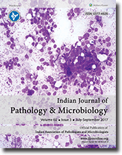
Indian Journal of Pathology and Microbiology
Scope & Guideline
Championing Open Access to Scientific Excellence
Introduction
Aims and Scopes
- Histopathological Research:
The journal prioritizes studies that explore histopathological changes associated with various diseases, including cancers, autoimmune disorders, and infectious diseases. This includes both case studies and larger cohort analyses. - Microbiological Studies:
Research related to microbiology, particularly focusing on the identification, characterization, and clinical implications of various pathogens, is a core focus of the journal. This includes studies on antibiotic resistance, emerging infectious diseases, and the role of microbiota in health. - Innovative Diagnostic Techniques:
The journal encourages the development and evaluation of new diagnostic methodologies, including immunohistochemistry, molecular techniques, and digital pathology, aimed at improving disease detection and characterization. - Clinical Pathology Correlations:
Many articles emphasize the correlation between clinical findings and pathological diagnoses, providing insights into prognostic factors and treatment outcomes. - Emerging Pathological Entities:
The journal actively publishes research on rare and newly recognized pathological entities, contributing to the broader understanding of unusual presentations and their implications for diagnosis and management.
Trending and Emerging
- COVID-19 Related Research:
There has been a significant increase in research related to COVID-19, including its pathological effects, secondary infections, and the impact on various organ systems, highlighting the pandemic's influence on research directions. - Molecular Pathology:
Emerging themes in molecular pathology, particularly the use of genetic and molecular markers for diagnosis and prognosis, are gaining traction, reflecting advancements in technology and the need for precision medicine. - Immunohistochemistry and Biomarkers:
Research focusing on immunohistochemical markers and their prognostic significance in various cancers is increasingly prevalent, indicating a trend towards personalized treatment strategies. - Digital Pathology and AI Integration:
The integration of digital pathology and artificial intelligence in diagnostic processes is a growing area of interest, as the journal highlights innovations that enhance diagnostic accuracy and efficiency. - Clinical and Pathological Correlation Studies:
There is a rising trend in studies that correlate clinical outcomes with pathological findings, emphasizing the importance of bridging the gap between laboratory results and patient management.
Declining or Waning
- Traditional Histopathology:
There seems to be a waning interest in purely descriptive histopathological studies without novel insights or methodologies, as the field moves towards more integrated and technology-driven approaches. - Basic Microbiological Studies:
Basic studies focused solely on the identification of pathogens without clinical correlation or innovative methods are appearing less frequently, suggesting a shift towards more applied research that addresses clinical relevance. - Single Case Reports:
The prevalence of single case reports has decreased, as the journal increasingly favors studies that present comprehensive data or larger sample sizes that can provide more significant insights into disease patterns.
Similar Journals
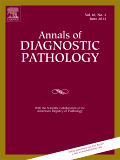
Annals of Diagnostic Pathology
Pioneering Insights for Enhanced Diagnostic Accuracy.Annals of Diagnostic Pathology, published by Elsevier Science Inc, is a pivotal journal in the field of diagnostic pathology that has significantly contributed to the advancement of medical science since its inception in 1997. With an ISSN of 1092-9134 and E-ISSN of 1532-8198, this esteemed journal is positioned within the Q2 category in both Medicine (miscellaneous) and Pathology and Forensic Medicine, reflecting its high-quality research contributions, showcased by its ranking at #73 out of 208 in Scopus for the latter category. The journal's scope encompasses various aspects of diagnostic pathology, from innovative techniques to critical reviews of pathologic findings, making it an essential resource for researchers, medical professionals, and students dedicated to enhancing diagnostic accuracy and patient care. Although it does not currently offer open access options, its wide readership and impactful publications continue to influence clinical practices and research agendas. With a convergence period extending to 2024, Annals of Diagnostic Pathology remains a leading platform for disseminating valuable knowledge in this dynamic field.

VIRCHOWS ARCHIV
Delivering Rigorous Insights for Clinical ExcellenceVirchows Archiv, published by Springer, is an esteemed journal dedicated to the fields of Medicine and Pathology, featuring high-quality research from various domains including Cell Biology and Molecular Biology. With its inception dating back to 1947, Virchows Archiv has been a pivotal platform for advancing the understanding of pathological and forensic medicine. As evidenced by its impressive Scopus rank, placing it within the top 15% of journals in Pathology and Forensic Medicine, it continues to maintain a strong presence with a Q1 classification in its category as of 2023. Although it does not offer Open Access options, the journal remains critical for researchers and professionals seeking to publish and access pioneering findings that can impact clinical practices and the academic community. The journal’s rigorous peer-review process ensures that only the highest quality research is disseminated, making it an essential resource for those engaged in the ever-evolving fields of health and biological sciences.
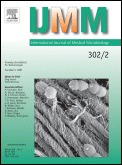
INTERNATIONAL JOURNAL OF MEDICAL MICROBIOLOGY
Exploring the Complexities of Microbial PathogenesisWelcome to the International Journal of Medical Microbiology, a leading publication in the field of microbiological research and infectious diseases, offered by Elsevier GmbH. Established in 2000, this esteemed journal provides a scholarly platform for the presentation of high-quality research, reviews, and innovations that bridge medical microbiology and clinical applications. With an impressive impact factor positioning it within the Q1 category across multiple disciplines, including Infectious Diseases, Microbiology, and Medicine, the journal is recognized for its rigorous peer-review process and significant contributions to advancing our understanding of microbial pathogenesis, diagnostics, and therapeutics. The International Journal of Medical Microbiology is committed to open access, promoting the dissemination of knowledge and accessibility for researchers, professionals, and students worldwide. Based in Munich, Germany, the journal continues to play a vital role in the global scientific community, fostering collaborations and inspiring future innovations in the fight against infectious diseases.
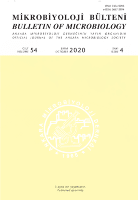
MIKROBIYOLOJI BULTENI
Unveiling the Complexities of Microbial LifeMIKROBIYOLOJI BULTENI, with ISSN 0374-9096, is a prestigious academic journal published by the ANKARA MICROBIOLOGY SOC, located in Ankara, Turkey. Established in 1973, this journal has been a vital conduit for disseminating research in the fields of Immunology, Microbiology, and Infectious Diseases, garnering a reputation as a significant contributor to the scientific community. The journal is currently ranked in the Q3 category within Immunology and Microbiology (miscellaneous), and Infectious Diseases, indicating its impactful presence amidst contemporary research. With access options that may be restricted, MIKROBIYOLOJI BULTENI actively welcomes submissions that advance the understanding of critical microbiological principles and practices, thereby supporting both national and international research efforts. Researchers, professionals, and students are encouraged to explore the latest findings shared in this journal, as it continually shapes the landscape of microbiology and infectious disease studies through its comprehensive and rigorous peer-reviewed publications.

Oral & Maxillofacial Pathology Journal
Empowering Professionals through Open Access InsightsOral & Maxillofacial Pathology Journal is a prominent peer-reviewed publication dedicated to advancing the field of oral and maxillofacial pathology. Published by the KAIRALI SOCIETY OF ORAL & MAXILLOFACIAL PATHOLOGISTS, this journal aims to provide a platform for sharing innovative research, clinical practices, and new techniques related to the diagnosis and management of oral diseases. With a commitment to open access, it ensures that valuable knowledge reaches a global audience of researchers, dental professionals, and students alike. Although specific impact metrics such as the HIndex and Scopus ranking are not listed, the journal is regarded as an essential resource for those involved in the oral health community. It plays a crucial role in fostering collaboration and disseminating cutting-edge advancements that can enhance patient care and clinical outcomes in oral pathology. For professionals looking to stay ahead in this dynamic field, Oral & Maxillofacial Pathology Journal serves as an indispensable tool for both foundational learning and advanced research.

ENDOCRINE PATHOLOGY
Delivering Impactful Research for Better Patient OutcomesENDOCRINE PATHOLOGY is a premier journal published by HUMANA PRESS INC, dedicated to advancing the understanding of endocrine disorders through innovative research and clinical practices. With an impressive impact factor and consistently ranked in the Q1 quartile across multiple categories such as Endocrinology, Diabetes and Metabolism, as well as Pathology and Forensic Medicine, this journal serves as a pivotal resource for researchers and professionals in the field. The journal covers a broad spectrum of topics related to endocrine pathology, providing insights into mechanisms, diagnostics, and therapeutics that inform both clinical and laboratory practices. Although it does not offer open access, its rigorous peer-review process ensures the dissemination of high-quality, impactful research that shapes clinical strategies and enhances patient care. With distribution spanning from its inception in 1990 to 2024, ENDOCRINE PATHOLOGY stands at the forefront of endocrine research, making it an essential read for anyone involved in the study and treatment of endocrine disorders.
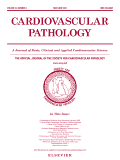
CARDIOVASCULAR PATHOLOGY
Connecting researchers and clinicians for better outcomes.CARDIOVASCULAR PATHOLOGY, published by Elsevier Science Inc, is a distinguished journal dedicated to the dissemination of high-quality research in the fields of cardiology, pathology, and cardiovascular medicine. With an ISSN of 1054-8807 and an E-ISSN of 1879-1336, this journal has established itself as a vital resource for researchers, clinicians, and students alike. It is positioned in the Q2 quartile for both cardiology and pathology, indicating its significant impact and relevance in these disciplines. The journal offers a platform for innovative studies, reviews, and clinical insights, aiming to enhance our understanding of cardiovascular conditions and their pathological underpinnings. With an H-index that showcases its scholarly influence, CARDIOVASCULAR PATHOLOGY is committed to advancing the field through rigorous peer review and open dialogue among professionals. The journal is accessible through institutional subscriptions, making it an essential reference point for ongoing research through its convergence of knowledge from 1992 through 2024.
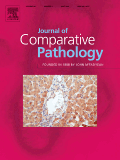
JOURNAL OF COMPARATIVE PATHOLOGY
Pioneering Research in Pathology and Forensic MedicineJOURNAL OF COMPARATIVE PATHOLOGY, published by Elsevier Science Ltd, stands as a significant publication within the fields of pathology and forensic medicine, as well as veterinary studies. With an ISSN of 0021-9975 and an E-ISSN of 1532-3129, this journal has been disseminating critical research since 1950, contributing to the advancement of knowledge through its focus on comparative pathology. The journal's reputable standing is underscored by its Q3 classification in Pathology and Forensic Medicine and Q2 in Veterinary (miscellaneous) for 2023, reflecting its vital role in shaping contemporary discourse in these domains. The Scopus ranks further solidify its presence, placing it at the 51st percentile in general veterinary sciences and the 32nd percentile in pathology—a testament to the quality and relevance of the contributions it publishes. Although it operates under a subscription model, the journal remains accessible to researchers and practitioners who aim to deepen their understanding of pathological phenomena across species, enhance diagnostic accuracy, and improve clinical practices. With a steadfast commitment to rigorous peer review and a global readership, the JOURNAL OF COMPARATIVE PATHOLOGY is an essential resource for those engaged in research and professional practice, fostering collaborations and innovations that bridge complementary areas of study.
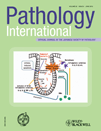
PATHOLOGY INTERNATIONAL
Innovating Insights for a Healthier TomorrowPATHOLOGY INTERNATIONAL, published by WILEY, stands as a distinguished journal in the field of pathology and forensic medicine, serving as an essential resource for researchers, clinicians, and students alike. With its ISSN 1320-5463 and E-ISSN 1440-1827, PATHOLOGY INTERNATIONAL has established itself since its inception in 1951, navigating through an evolving landscape in medical science with insights and breakthroughs up to 2024. It holds a commendable Q2 ranking in both the Medicine (miscellaneous) and Pathology and Forensic Medicine categories, indicating its robust influence and quality within these fields, as evidenced by its placement in the 70th percentile of Scopus rankings. While currently not an open-access journal, it provides access options that ensure valuable research remains available to the academic community. PATHOLOGY INTERNATIONAL commits to advancing the discipline through pioneering research articles, comprehensive reviews, and expert opinions that push the boundaries of understanding in pathology, thereby supporting the enhancement of diagnostic and therapeutic practices.

International Journal of Clinical and Experimental Pathology
Fostering Collaboration in the World of PathologyInternational Journal of Clinical and Experimental Pathology, published by E-CENTURY PUBLISHING CORP, serves as a vital resource for professionals in the field of pathology. With its ISSN 1936-2625, the journal has positioned itself within the competitive landscape of medical journals, achieving commendable rankings in Scopus, particularly in the categories of Pathology and Forensic Medicine (Rank #98/185) and Histology (Rank #38/58). Although its coverage in Scopus has been discontinued, the journal’s past contributions from 2009 to 2017 continue to be a touchstone for researchers interested in advancing their understanding of clinical and experimental pathology. The open-access format ensures accessibility to a wide audience, fostering collaboration and education in this essential medical discipline. By bridging clinical research and experimental findings, this journal plays a crucial role in disseminating knowledge and enhancing practices within pathology, making it an indispensable tool for researchers, professionals, and students alike.